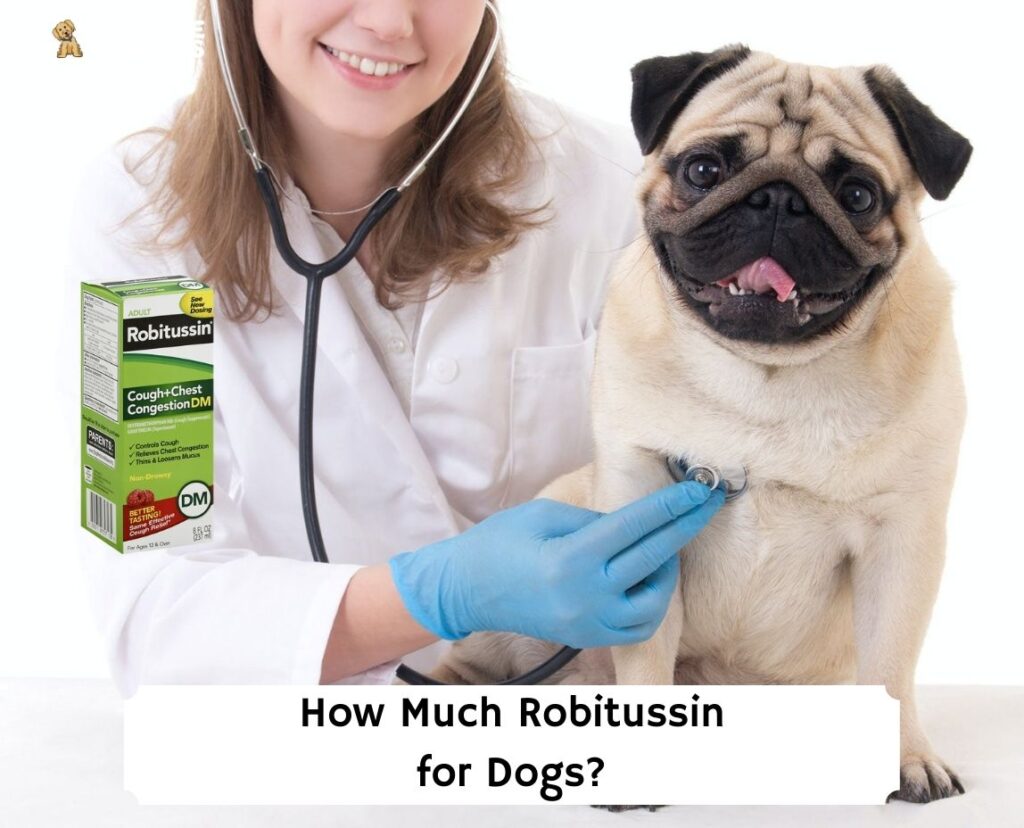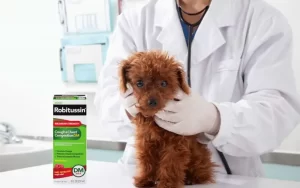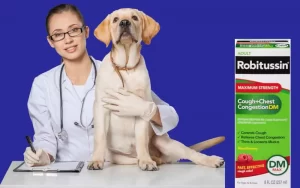
Although there are some significant distinctions between humans and their pet dogs, some over-the-counter medications can be safe to use for you and your animal in small amounts. For example, items like Robitussin can be helpful as a cough suppressant for your four-legged friend if they contracted Kennel Cough.
So, how much Robitussin for dogs is a safe amount?
Other articles you would like: How Much Pepto Bismol for Dogs?
Is Robitussin Safe for Dogs?

Monitoring the health of your dog is a critical aspect of pet ownership. Unfortunately, when your animal is not feeling well or has health issues, frequent trips to the local vet can add up and cost a pretty penny.
Thankfully, there are some over-the-counter medications, including some Robitussin varieties, that can provide relief for some symptoms in your dog.
However, not all of these products are safe, which leads many dog owners to ask, is Robitussin toxic to dogs?
Read the Label
Before administering Robitussin or any over-the-counter medication, you should always read the label. Although some medicinal remedies may seem safe, varieties can include additional ingredients that are toxic or harmful to your pet.
Dogs should never ingest acetaminophen, ibuprofen, codeine, or synthetic sweeteners, like Xylitol. If you are unsure of a product’s ingredients, it is best to avoid giving it to your pet until you talk to a veterinarian.
Be Aware of Any Pre-Existing Conditions or Medications
While Robitussin may seem harmless to your animal, if they have a pre-existing condition or currently take prescription medication from your veterinarian this over-the-counter medication may be off-limits.
Dogs with these considerations should not receive Robitussin in any form:
- Ones with heart conditions or heart disease
- Who have active pneumonia
- Who are allergic to Dextromethorphan
- Ones who currently take sedatives, tranquilizers, or barbiturates
- If they had MAO inhibitors in the past two weeks
- Pregnant or nursing animals
- Puppies or dogs under five pounds (two kilograms)
Of course, this is not a complete list, and only your veterinarian can provide the best advice when it comes to administering an over-the-counter medication like Robitussin to your pet.
Are All Robitussin Products Safe for My Pet?
Unfortunately no, not all Robitussin products are safe. While Pfizer produces many cough suppressants and cold medication varieties for humans of all ages, not all of their items are safe to administer to your pet.
Robitussin manufactures numerous over-the-counter medications to help relieve symptoms of cough, colds, and the flu for adults and children. The varieties for adults include:
- Robitussin DM: contains Dextromethorphan HBr and Guaifenesin
- Robitussin AC: contains Codeine
- Robitussin CF: contains Acetaminophen and Dextromethorphan HBr
- Robitussin Long-Lasting Cough Gels: contains Dextromethorphan HBr
- Robitussin 12-Hour: contains Dextromethorphan polistirex and Dextromethorphan hydrobromide
After looking at some of the standard adult Robitussin products, only Robitussin DM is a relatively safe option to give your dog when they need short-term relief. Therefore, many pet owners opt for using Robitussin for a dog’s kennel cough to help provide short-term relief.
Check out for more: How Long Does it Take for a Dog to Gain Weight? and How Much Pumpkin for Dogs?
Robitussin DM for Dogs

There are many claims that Robitussin DM is safe for dogs. Some vets will even recommend this common human medication to help animals dealing with a cough. While this is generally true, there are some guidelines to follow.
Cough suppressants, like Robitussin DM, are for short-term use only. If your animal continues to show prolonged symptoms of coughing, wheezing, or other general signs of being unwell, you should contact your veterinarian for further help.
Robitussin Dosage for Dogs
Now that you know which type of Robitussin product is safe for your pet, you will now need to determine how much Robitussin for dogs is safe. No one wants to give their animal too much medication as it can cause immediate discomfort and issues – or even the death of your pet.
This helpful guide is not set in stone, and you should only follow it under the permission of your local veterinarian. Some animals may be more sensitive to over-the-counter medication than others, so lower dosages are always a better choice than giving them too much.
A safe Dextromethorphan dose for dogs is generally 0.5 to 1mg per pound of body weight (1 to 1.5mg per kilogram of body weight), every 8 to 12 hours. Pet owners should not give puppies or dogs under five pounds (two kilograms) any Dextromethorphan products before seeking a vet’s advice.
For example, if you asked how much Robitussin can I give my dog, who weighs 50 pounds, it would equal two to three teaspoons of liquid Robitussin DM every 8 to 12 hours. If you prefer tablet form, your 50-pound dog should receive a maximum of 45 to 50 mg at each interval.
This helpful table can make it easier to determine the liquid and tablet dosage of Dextromethorphan for your pet. However, remember that these dosage amounts are only a guideline, and you should not use them as a standard dosing quantity.
Liquid Robitussin Dosage for Dogs

You can administer liquid Robitussin in various ways to your pet. One of the most effective ways is to use a medicine syringe to squirt it into the mouth near the back of the throat. Other pet owners may prefer adding it to their food.
- 5+ lbs (2+ kg): ¼ teaspoon
- 10+ lbs (4+ kg): ½ teaspoon
- 20+ lbs (9+ kg): 1 teaspoon
- 30+ lbs (13+ kg): 1.5 teaspoons
- 40+ lbs (18+ kg): 2 teaspoons
- 50+ lbs (22+ kg): 2 – 3 teaspoons
- 60+ lbs (27+ kg): 1 tablespoon
- 70+ lbs (30+ kg): 1 tablespoon
- 80+ lbs (36+ kg): 1 tablespoon
- 90+ lbs (40+ kg): 1.5 tablespoons
- 100+ lbs (45+ kg): 2 tablespoons
These measurements are to be used as a guideline only and may not be adequate or safe for all dogs. It is up to you as a pet owner to seek the professional advice of your local veterinarian for the best dosage to provide your four-legged friend to ensure a safe amount.
Tablet Robitussin Dosage for Dogs
Pet owners may prefer tablet-form Robitussin to save on the mess and hassle of administering liquid medication to their pets.
Some dogs will easily take pills when you offer them medicines in a treat or within a piece of cheese. In addition, tablets can be crushed and added to a dog’s food for easy dosing.
- 5+ lbs (2+ kg): 2 – 5 mg
- 10+ lbs (4+ kg): 8 – 12 mg
- 20+ lbs (9+ kg): 15 – 20 mg
- 30+ lbs (13+ kg): 25 – 30 mg
- 40+ lbs (18+ kg): 35 – 40 mg
- 50+ lbs (22+ kg): 45 – 50 mg
- 60+ lbs (27+ kg): 55 – 60 mg
- 70+ lbs (30+ kg): 65 – 75 mg
- 80+ lbs (36+ kg): 65 – 75 mg
- 90+ lbs (40+ kg): 90 – 100 mg
- 100+ lbs (45+ kg): 100 mg
Keep in mind that some dogs may be more sensitive to medications than other animals. Therefore, be sure to follow the advice of your veterinarian for dosage amounts and carefully monitor your pet during this time for any side effects.
Talk to Your Veterinarian
Before administering any type of medication to your furry friend, you should consult your local veterinarian. Although some dog breeds can handle small doses of Robitussin for short periods, your animal may have underlying conditions that make this treatment unsafe.
A professional vet can also provide you with up-to-date guidance on proper dosing and frequency if you are unsure. You do not want to give your animal too much medication for obvious reasons.
Side Effects of Robitussin

Even safe over-the-counter medication can cause side effects in humans and dogs. Even animals who have never shown any allergies or adverse effects to medicines before can develop sensitivities.
Robitussin can create some mild to moderate issues in your pet, so you should monitor them carefully after administering this product for any of these symptoms.
- Anxiety, nervousness, or confusion
- Breathing problems
- Change in heart rate, significantly higher or lower
- Dizziness
- Drowsiness or lethargy
- Hives or facial swelling
- Loss of appetite
- Muscle tremors
- Nausea
- Restlessness
- Seizures
- Urination difficulties
- Vomiting
- Weakness
Dogs do not have to take too much medication to show symptoms if they are sensitive to certain over-the-counter products. However, even small doses can affect them if their body cannot digest or process the medication adequately.
However, it is easy to give your animal too much medication accidentally.
If your animal shows one or more of these side effects, or you believe they took too much medication, seek advice from your local veterinarian as soon as possible. Pet owners can also call the Animal Poison Control Center at (888) 426-4435.
Conclusion for How Much Robitussin for Dogs?
Robitussin can be a helpful over-the-counter medication for pet owners to use for their dogs suffering from kennel cough. However, not all Robitussin products are safe for dogs, so it is vital that you only provide Robitussin DM to your furry friend when necessary.
Remember that this product will not cure your pet, as it will only help minimize their symptoms.
Additionally, proper dosage and careful monitoring are critical to ensure their animal remains safe while taking this medication. This way, you can spot any sudden or ill side-effects as soon as possible and seek help and treatment quickly.
How much Robitussin for a dog is correct? Save this article for future reference as it contains all the information you need to answer this question.
You will also like:
- How Much is a Puppuccino at Starbucks?
- How much does a shock collar cost?

Dr. Sabrina Kong graduated from the Royal Veterinary College in England in 2016 and has been working at a small animal clinic in Northern California since then. She grew up in the Bay Area and got her bachelor’s degree from Cal Poly San Luis Obispo. She also became a Certified Canine Rehabilitation Practitioner through a program at the University of Tennessee.
When she isn’t in the clinic taking care of her four-legged patients, she enjoys traveling and trying new foods with her friends and her three-legged dog, Apollo. She adopted Apollo from her clinic when he was a puppy with numerous health issues. Dr. Kong truly cares about taking care of animals.

